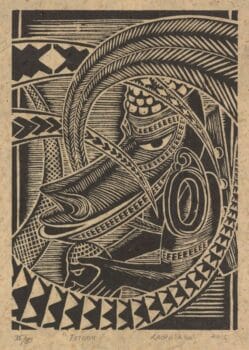Dear friends,
Greetings from the desk of Tricontinental: Institute for Social Research.
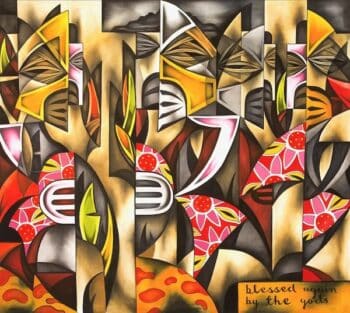
Mahiriki Tangaroa (Kūki ’Airani), Blessed Again by the Gods (Spring), 2015.
Since May, a powerful struggle has rocked Kanaky (New Caledonia), an archipelago located in the Pacific, roughly 1,500 kilometres east of Australia. The island, one of five overseas territories in the Asia-Pacific ruled by France, has been under French colonial rule since 1853. The indigenous Kanak people initiated this cycle of protests after the French government of Emmanuel Macron extended voting rights in provincial elections to thousands of French settlers in the islands. The unrest led Macron to suspend the new rules while subjecting islanders to severe repression. In recent months, the French government has imposed a state of emergency and curfew on the islands and deployed thousands of French troops, which Macron says will remain in New Caledonia for ‘as long as necessary’. Over a thousand protesters have been arrested by French authorities, including Kanak independence activists such as Christian Tein, the leader of the Coordination Cell for Field Actions (Cellule de coordination des actions de terrain, or CCAT), some of them sent to France to face trial. The charges against Tein and others, such as for organised crime, would be laughable if the consequences were not so serious.
The reason France has cracked down so severely on the protests in New Caledonia is that the old imperial country uses its colonies not only to exploit its resources (New Caledonia holds the world’s fifth largest nickel reserves), but also to extend its political reach across the world—in this case, to have a military footprint in China’s vicinity. This story is far from new: between 1966 and 1996, for instance, France used islands in the southern Pacific for nuclear tests. One of these tests, Operation Centaure (July 1974), impacted all 110,000 residents on the Mururoa atoll of French Polynesia. The struggle of the indigenous Kanak peoples of New Caledonia is not only about freedom from colonialism, but also about the terrible military violence inflicted upon these lands and waters by the Global North. The violence that ran from 1966 to 1996 mirrors the disregard that the French still feel for the islanders, treating them as nothing more than detritus, as if they had been shipwrecked on these lands.
In the backdrop of the current unrest in New Caledonia is the Global North’s growing militarisation of the Pacific, led by the United States. Currently, 25,000 military personnel from 29 countries are conducting Rim of the Pacific (RIMPAC), a military exercise that runs from Hawai’i to the edge of the Asian mainland. Tricontinental: Institute for Social Research worked with an array of organisations—a number of them from the Pacific and Indian Oceans—to draft red alert no. 18 on this dangerous development. Their names are listed below.
What is RIMPAC?
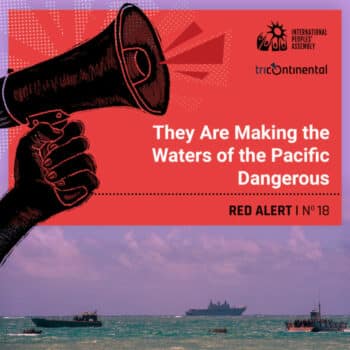 The U.S. and its allies have held Rim of the Pacific (RIMPAC) exercises since 1971. The initial partners of this military project were Australia, Canada, New Zealand, the United Kingdom, and the United States, which are also the original members of the Five Eyes (now Fourteen Eyes) intelligence network built to share information and conduct joint surveillance exercises. They are also the major Anglophone countries of the North Atlantic Treaty Organisation (NATO, set up in 1949) and are the members of the Australia-New Zealand-U.S. strategy treaty ANZUS, signed in 1951. RIMPAC has grown to be a major biennial military exercise that has drawn in a number of countries with various forms of allegiance to the Global North (Belgium, Brazil, Brunei, Chile, Colombia, Ecuador, France, Germany, India, Indonesia, Israel, Italy, Japan, Malaysia, Mexico, the Netherlands, Peru, the Philippines, Republic of Korea, Singapore, Sri Lanka, Thailand, and Tonga).
The U.S. and its allies have held Rim of the Pacific (RIMPAC) exercises since 1971. The initial partners of this military project were Australia, Canada, New Zealand, the United Kingdom, and the United States, which are also the original members of the Five Eyes (now Fourteen Eyes) intelligence network built to share information and conduct joint surveillance exercises. They are also the major Anglophone countries of the North Atlantic Treaty Organisation (NATO, set up in 1949) and are the members of the Australia-New Zealand-U.S. strategy treaty ANZUS, signed in 1951. RIMPAC has grown to be a major biennial military exercise that has drawn in a number of countries with various forms of allegiance to the Global North (Belgium, Brazil, Brunei, Chile, Colombia, Ecuador, France, Germany, India, Indonesia, Israel, Italy, Japan, Malaysia, Mexico, the Netherlands, Peru, the Philippines, Republic of Korea, Singapore, Sri Lanka, Thailand, and Tonga).
RIMPAC 2024 began on 28 June and runs through 2 August. It is being held in Hawaiʻi, which is an illegally occupied territory of the United States. The Hawai’ian independence movement has a history of resisting RIMPAC, which is understood to be part of the U.S. occupation of sovereign Hawai’ian land. The exercise includes over 150 aircraft, 40 surface ships, three submarines, 14 national land forces, and other military equipment from 29 countries, though the bulk of the fleet is from the United States. The goal of the exercise is ‘interoperability’, which effectively means integrating the military (largely naval) forces of other countries with that of the United States. The main command and control for the exercise is managed by the U.S., which is the heart and soul of RIMPAC.
Why is RIMPAC so dangerous?
RIMPAC-related documents and official statements indicate that the exercises allow these navies to train ‘for a wide range of potential operations across the globe’. However, it is clear from both U.S. strategic documents and the behaviour of the U.S. officials who run RIMPAC that the centre of focus is China. Strategic documents also make it clear that the U.S. sees China as a major threat, even as the main threat, to U.S. domination and believes that it must be contained.
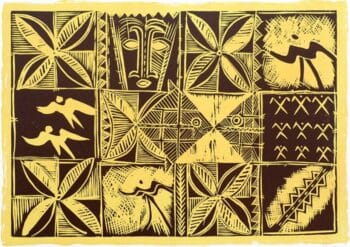
Fatu Feu’u (Samoa), Mata Sogia, 2009.
This containment has come through the trade war against China, but more pointedly through a web of military manoeuvres by the United States. This includes establishing more U.S. military bases in territories and countries surrounding China; using U.S. and allied military vessels to provoke China through freedom of navigation exercises; threatening to position U.S. short-range nuclear missiles in countries and territories allied with the U.S., including Taiwan; extending the airfield in Darwin, Australia, to position U.S. aircraft with nuclear missiles; enhancing military cooperation with U.S. allies in East Asia with language that shows precisely that the target is to intimidate China; and holding RIMPAC exercises, particularly over the past few years. Though China was invited to participate in RIMPAC 2014 and RIMPAC 2016, when the tension levels were not so high, it has been disinvited since RIMPAC 2018.
Though RIMPAC documents suggest that the military exercise is being conducted for humanitarian purposes, this is a Trojan Horse. This was exemplified, for instance, at RIMPAC 2000, when the militaries conducted the Strong Angel international humanitarian response training exercise. In 2013, the United States and the Philippines cooperated in providing humanitarian assistance after the devastating Typhoon Haiyan. Shortly after that cooperation, the U.S. and the Philippines signed the Enhanced Defence Cooperation Agreement (2014), which allows the U.S. to access bases of the Philippine military to maintain its weapons depots and troops. In other words, the humanitarian operations opened the door to deeper military cooperation.
RIMPAC is a live-fire military exercise. The most spectacular part of the exercise is called Sinking Exercise (SINKEX), a drill that sinks decommissioned warships off the coast of Hawai’i. RIMPAC 2024’s target ship will be the decommissioned USS Tarawa, a 40,000-tonne amphibious assault vessel that was one of the largest during its service period. There is no environmental impact survey of the regular sinking of these ships into waters close to island nations, nor is there any understanding of the environmental impact of hosting these vast military exercises not only in the Pacific but elsewhere in the world.
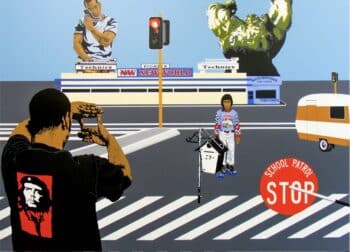
Kelcy Taratoa (Aotearoa), Episode 0010 from the series Who Am I? Episodes, 2004.
RIMPAC is part of the New Cold War against China that the U.S. imposes on the region. It is designed to provoke conflict. This makes RIMPAC a very dangerous exercise.
What is Israel’s role in RIMPAC?
Israel, which is not a country with a shoreline on the Pacific Ocean, first participated in RIMPAC 2018, and then again in RIMPAC 2022 and RIMPAC 2024. Although Israel does not have aircraft or ships in the military exercise, it is nonetheless participating in its ‘interoperability’ component, which includes establishing integrated command and control as well as collaborating in the intelligence and logistical part of the exercise. Israel is participating in RIMPAC 2024 at the same time that it is waging a genocide against Palestinians in Gaza. Though several of the observer states in RIMPAC 2024 (such as Chile and Colombia) have been forthright in their condemnation of the genocide, they continue to participate alongside Israel’s military in RIMPAC 2024. There has been no public indication of their hesitation about Israel’s involvement in these dangerous joint military exercises.
Israel is a settler-colonial country that continues its murderous apartheid and genocide against the Palestinian people. Across the Pacific, indigenous communities from Aotearoa (New Zealand) to Hawai’i have led the protests against RIMPAC over the course of the past 50 years, saying that these exercises are held on stolen ground and waters, that they disregard the negative impact on native communities upon whose land and waters live-fire exercises are held (including areas where atmospheric nuclear testing was previously conducted), and that they contribute to the climate disaster that lifts the waters and threatens the existence of the island communities. Though Israel’s participation is unsurprising, the problem is not merely its involvement in RIMPAC, but the existence of RIMPAC itself. Israel is an apartheid state that is conducting a genocide, and RIMPAC is a colonial project that threatens an annihilationist war against the peoples of the Pacific and China.
Ralph Ako (Solomon Islands), Toto Isu, 2015.
Te Kuaka (Aotearoa)
Red Ant (Australia)
Workers Party of Bangladesh (Bangladesh)
Coordinadora por Palestina (Chile)
Judíxs Antisionistas contra la Ocupación y el Apartheid (Chile)
Partido Comunes (Colombia)
Congreso de los Pueblos (Colombia)
Coordinación Política y Social, Marcha Patriótica (Colombia)
Partido Socialista de Timor (Timor Leste)
Hui Aloha ʻĀina (Hawai’i)
Communist Party of India (Marxist—Leninist) Liberation (India)
Federasi Serikat Buruh Demokratik Kerakyatan (Indonesia)
Federasi Serikat Buruh Militan (Indonesia)
Federasi Serikat Buruh Perkebunan Patriotik (Indonesia)
Pusat Perjuangan Mahasiswa untuk Pembebasan Nasional (Indonesia)
Solidaritas.net (Indonesia)
Gegar Amerika (Malaysia)
Parti Sosialis Malaysia (Malaysia)
No Cold War
Awami Workers Party (Pakistan)
Haqooq-e-Khalq Party (Pakistan)
Mazdoor Kissan Party (Pakistan)
Partido Manggagawa (Philippines)
Partido Sosyalista ng Pilipinas (Philippines)
The International Strategy Center (Republic of Korea)
Janatha Vimukthi Peramuna (Sri Lanka)
Tricontinental: Institute for Social Research
Communist Party of Nepal (Unified Socialist)
CODEPINK: Women for Peace (United States)
Nodutdol (United States)
Party for Socialism and Liberation (United States)
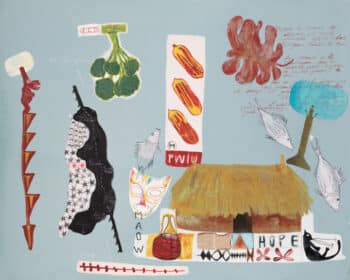
Stéphane Foucaud (New Caledonia), MAOW! (2023).
When the political protests began in New Caledonia in May, I hastened to find a book of poems by Kanak independence leader Déwé Gorodé (1949—2022) called Under the Ashes of the Conch Shells (Sous les cendres des conques, 1974). In this book, written the same year that Gorodé joined the Marxist political group Red Scarves (Foulards rouges), she wrote the poem ‘Forbidden Zone’ (Zone interdite), which concludes:
Reao Vahitahi Nukutavake
Pinaki Tematangi Vanavana
Tureia Maria Marutea
Mangareva MORUROA FANGATAUFA
Forbidden zone
somewhere in
so-called ‘French’ Polynesia.
These are the names of islands that had already been impacted by the French nuclear bomb tests. There are no punctuation marks between the names, which indicates two things: first, that the end of an island or a country does not mark the end of nuclear contamination, and second, that the waters that lap against the islands do not divide the people who live across vast stretches of ocean, but unite them against imperialism. This impulse drove Gorodé to found Group 1878 (named for the Kanak rebellion of that year) and then the Kanak Liberation Party (Parti de libération kanak, or PALIKA) in 1976, which evolved out of Group 1878. The authorities imprisoned Gorodé repeatedly from 1974 to 1977 for her leadership in PALIKA’s struggle for independence from France.
During her time in prison, Gorodé built the Group of Exploited Kanak Women in Struggle (Groupe de femmes Kanak exploitées en lutte) with Susanna Ounei. When these two women left prison, they helped found the Kanak National Liberation and Socialist Front (Front de Libération Nationale Kanak et Socialiste) in 1984. Through concerted struggle, Gorodé was elected the vice president of New Caledonia in 2001.
In 1985, thirteen countries of the south Pacific signed the Treaty of Rarotonga, which established a nuclear-free zone from the east coast of Australia to the west coast of South America. As French colonies, neither New Caledonia nor French Polynesia signed it, but others did, including the Solomon Islands and Kūki ‘Airani (Cook Islands). Gorodé is now dead, and U.S. nuclear weapons are poised to enter northern Australia in violation of the treaty. But the struggle does not die away.
Roads are still blocked. Hearts are still opened.
Warmly,
Vijay


